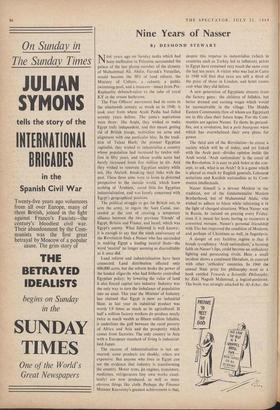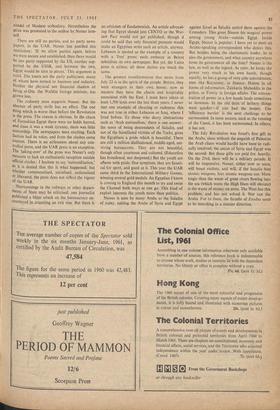Nine Years of Nasser
By DESMOND STEWART NIn years ago on Sunday tanks which had been ineffective in Palestine surrounded the palace of the last plump member of the dynasty of Muhammad Ali. Abdin, Farouk's Versailles, would become the HQ of land reform, the Ministry of Culture, a cabaret, a public swimming-pool, and a museum—intact from Pre- Raphaelite debauch-salon to the tube of royal KY in the ornate bathroom.
The Free Officers' movement had its roots in the nineteenth century as much as in 1948; it took over from where Arabi Pasha had failed seventy years before. The junta's aspirations were three: like Arabi, they wished to make Egypt truly independent, and this meant getting rid of British troops, restriction on arms and alignment with one particular bloc. In the tradi- tion of Talaat Harb, •the pioneer Egyptian capitalist, they wished to industrialise a country whose population had increased by twelve mil- lion in fifty years, and whose arable acres had barely increased from five million to six. And they wished to renovate Egyptian society while not, like Ataturk. breaking their links with the past. These three aims were to loom in distorted perspective to the outside world, which knew nothing of 'Arabism; cared little for Egyptian industrialisation, and was keenly concerned with . Egypt's geographical position.
The political struggle to get the British out, to arm the army, to regain the Suez Canal, suc- ceeded at the cost of creating a temporary alliance between the two previous `friends' of Egypt, Britain and France, and Israel, which was Egypt's enemy. What followed is well known: it is enough to say that the ninth anniversary of the Revolution finds a Nasser who has succeeded in making Egypt a leading neutral State—the word 'neutral' no longer seeming as discreditable as it once did.
Land reform and industrialisation have been connected. Land distribution affected only 600,000 acres, but the reform broke the power of the landed oligarchs who had hitherto controlled Egyptian policy; by lowering the value of land it also forced capital into industry. Industry was the only way to turn the imbalance of population into an asset. This year the Minister of Industry has claimed that Egypt is now an industrial State, as last year its industrial product was worth 1.9 times as much as its agricultural. If half a million factory workers do produce nearly twice as much wealth as fifteen million fellahin, it underlines the gulf between the rural poverty of Africa and Asia and the prosperity which comes from factories. The only country in Asia with a European standard of living is industrial- ised Japan.
The success of industrialisation is not un- marred; some products are shoddy, others are expensive. But anyone who lives in Egypt can see the evidence that industry is transforming the country. Motor tyres, jet engines, transistors, medicines, refrigerators (my own works excel- lently) are now produced, as well as more obvious things like cloth. Perhaps the Finance Minister Kaysouny's greatest achievement is that, despite this impetus to industrialise (which in countries such as Turkey led to inflation), prices in Egypt have remained very much the same over the last ten years. A visitor who was last in Cairo in 1948 will find that taxis are still a third of the price of those in London, and hotel rooms cost what they did before.
A new generation of Egyptians streams from the factory gates : the children of fellahin, but better dressed and earning wages which would be inconceivable in the village. The Middle Eastern Communists (few of whom are Egyptian) see in this class their future hope. For the Com- munists are against Nasser. To them, he personi- fies, not a revolution, but a petit bourgeois wave which has overwhelmed their own plans for power.
The third aim of the Revolution—to create a society which will be of today, and yet linked with the Arab past—divides opinion inside the Arab world. 'Arab nationalism' is the creed of the Revolution. It is easy to pick holes in the con- cept, to ask, what is an Arab? It is a game which i3 played as much by English generals, Lebanese sectarians and Kurdish nationalists as by Com- munist intellectuals.
Nasser himself is a devout Moslem in the tradition, not of the fundamentalist Moslem Brotherhood, but of Muhammad Abdu, who wished to adhere to Islam while reforming it in the light of changed situations. When Nasser was in Russia, he insisted on praying every Friday, even if it meant his hosts having to reconvert a converted mosque. Nasser's personal friendship with Tito has improved the condition of Moslems, and perhaps of Christians as well, in Jugoslavia.
A danger of any factitive regime is that it breeds sycophancy 'Arab nationalism,' a burning faith on Nasser's lips, could become an orthodoxy fighting and persecuting rivals. Here a small incident shows a continued liberalism, in contrast with other 'orthodox' countries. In 1960 the annual State prize for philosophy went to a book entitled Towards a Scientific Philosophy, by Zaki Naguib Mahmoud, a logical-positivist. The book was strongly attacked by Al-Azhar, the citadel of Moslem orthodoxy. Nevertheless the prize was presented to the author by Nasser him- self.
There are still no parties, and no party news- papers, in the UAR. Nasser has justified this restriction: 'If we allow parties again, before we were secure and established, then there would be one party supported by the US, another sup- ported by the USSR, and between the two, Egypt would be torn to pieces.' This argument is valid The losers are the party politicians, many of whom have turned to business and industry. Neither the physical nor financial shadow of Serag al-Din, the Wafdist foreign minister, has grown less.
The ordinary man supports Nasser. But the absence of party strife has an effect. The one thing which is worse than before the Revolution IS the press. The reason is obvious. In the chaos of Faroukian Egypt there were no holds barred, and since it was a weak tyranny, there was little censorship. The newspapers were exciting. Each faction had its voice, and from the clashes came interest. There is an airlessness about any con- trolled press, and the UAR press is no exception. The 'taking-over' of the press was Nasser's only measure to lack an enthusiastic reception outside official circles: I hesitate to say 'nationalisation,' as it is denied that this is what happened; but Whether communalised, socialised, nationalised or liberated, the press does not reflect the vigour of the UAR.
Shortcomings in the railways or other depart- ments of State may be criticised; one journalist Published a bitter attack on the bureaucracy en- countered in acquiring an exit visa. But there is no criticism of fundamentals. An article advocat- ing that Egypt should join CENTO or the War- saw Pact would not get published; though it could be said that only financial pressure would make an Egyptian write such an article, anyway. Lebanon is quoted as the example of a country with a 'free' press; each embassy in Beirut subsidises its own newspaper. But yet, the Cairo press is airless; all three dailies are much the same.
The greatest transformation that stems from July 23 is in the spirit of the people. Before, they were strangers in their own house; now as masters they have the charm and hospitality associated with the East. I must have taken at least 1,500 taxis over the last three years; I never met one example of cheating or rudeness; this was not true in either Lebanon or Iraq, where I lived before. To those who decry abstractions such as 'Arab nationalism,' there is one answer: the sense of being descendants of Saladin, and not of the humiliated victims of the Turks, gives the Egyptians a pride which is beautiful. There are still a million disillusioned, middle-aged, sur- viving bureaucrats. They are not beautiful, though often courteous and cultured. (Education has broadened, not deepened.) But the youth are aflame with pride. One symptom, they are fanati- cal for sport, and good at it. This year the UAR came third in the International Military Games, winning several gold medals. An Egyptian I know is coming to England this month to try and swim the Channel both ways at one go. This kind of exploit interests the youth more than politics.
Nasser is seen by many Arabs as the Saladin of today, uniting the Arabs of Syria and Egypt against Israel as Saladin united them against the Crusaders. This gives Nasser his magical power among young Arabs—outside Egypt. Inside Egypt, Nasser is popular; I have yet to meet an Arabic-speaking correspondent who denies this. But besides being the charismatic leader, he is also the government, and what country anywhere loves its government all the time? Nasser is the law, as well as the legend. As ruler, he keeps the power very much in his own hands, though equally, he has a group of very able subordinates, men like Kaysouny, in finance, Hatem in all forms of information, Zakkaria Muheddin in the police, or Fowzy in foreign affairs. The concen- tration of power in a few hands leads sOmetimes to slowness. In the old days of bribery, things went quicker—if you had the money. The 'efficiency barrier' is the next challenge to be surmounted. In some sectors, such as the running of the Canal, it has been surmounted. In others, it has not.
The July Revolution was Israel's first gift to the Arabs, since without the anguish of Palestine the Arab chaos would hardly have been so radi- cally resolved; the union of SVria and Egypt was the second. But these gifts are paid for, heavily. On the 23rd, there will be a military parade. It will be impressive. Nasser, either now or soon, will boast rockets, and will, if the Israelis hint atomic weapons, hint atomic weapons too. More tragic than the waste of great rivers flowing into the sea (which waste the High Dam will obviate) is the waste of money on arms. The West has this problem, and has not solved it. Nor can the Arabs. For to them, the Israelis of Exodus seem to be marching in a sinister direction.



















































 Previous page
Previous page